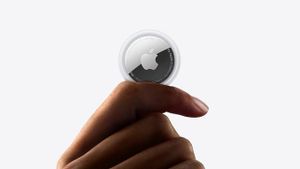JAKARTA - Since the COVID-19 pandemic, many of our habits have begun to change. One of them is holding meetings or meetings virtually.
Most people today are forced to spend time conducting virtual meetings. Good for work, social needs, to more personal interactions. Making people look at other people – as well as themselves – on the screen of communication devices.
For some people, this activity can be done for hours during the day. So, in some people too, causing the wrong perception of appearance. Some cases even fundamentally change the view of oneself.
Based on a report published in the International Journal of Women's Dermatology, the condition is named Zoom dysmorphua. This is a body dysmorphic disorder, particularly of the face. This condition makes a person have a wrong perception of their face.
In the report, published last January, researchers found an increase in patients seeking cosmetic consultation in half of the medical professionals surveyed. This increase is compared to the time before the pandemic.
A total of 86 percent of the total medical personnel surveyed revealed that patients use video conference calls as an excuse to change their appearance.
"As dependence on video calls increased, we began to see the impact of staring at ourselves for long periods of time on patients in a phenomenon we call Zoom dysmorphia," said Shadi Kourosh of Harvard Medical School. .
According to Kourosh and team's findings, increased screen time, coupled with the feeling of unattractiveness caused by a front-facing camera, triggers a person's unique subconscious response.
“Besides, spending more time on social media and viewing other people's edited photos triggers unhealthy comparisons with self-images in front of the camera – which to us is actually distorted and not a true reflection,” explains Kourosh.
Body Dysmorphic Disorder New Member GangguanFor sufferers of Body Dysmorphic Disorder, this behavior is not new. However, the pandemic has succeeded in creating a new way for BDD symptoms to manifest in a person's behavior
In the opinion of Fugen Neziroglu, PhD, psychology and executive director of the Bio Behavioral Institute treatment center, in New York, one of the habits of BDD sufferers is constantly looking at mirrors.
“Makes a lot of people think they are narcissists. Yet quite the opposite. These people (BDD sufferers, -ed) feel ugly and want to hide from other people," he explained.
Neziroglu also said that people with BDD also have their own opinions regarding appearance. In fact, they are willing to use any means in order to realize ideas related to their appearance.
“This is done with plastic surgery or using more affordable options. For example, constantly straightening your teeth with a nail file or massaging your own nose," he concluded.
The English, Chinese, Japanese, Arabic, and French versions are automatically generated by the AI. So there may still be inaccuracies in translating, please always see Indonesian as our main language. (system supported by DigitalSiber.id)













